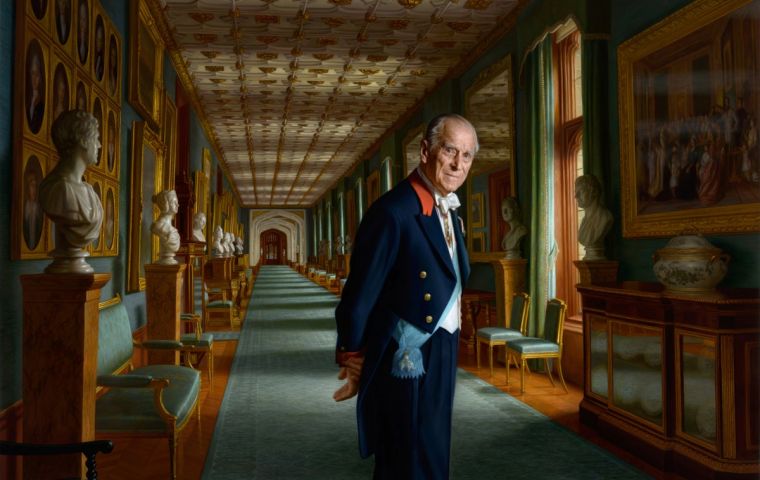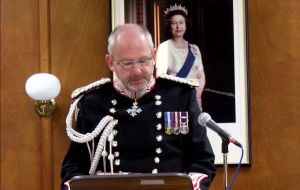MercoPress. South Atlantic News Agency
UK in mourning as Duke of Edinburgh dies aged 99
 He was referred to as “The Hun” by the Queen's mother and “Dearest Pa” by his late daughter in law, Diana of Wales.
He was referred to as “The Hun” by the Queen's mother and “Dearest Pa” by his late daughter in law, Diana of Wales.  Falklands' Governor, Nigel Phillips, said that the islands “would like to extend their sincere condolences to Her Majesty The Queen and the whole Royal Family”
Falklands' Governor, Nigel Phillips, said that the islands “would like to extend their sincere condolences to Her Majesty The Queen and the whole Royal Family” Prince Philip Mountbatten, Duke of Edinburgh and husband of Queen Elizabeth II, has died at Windsor Castle Friday, aged 99.
“It is with deep sorrow that Her Majesty The Queen announces the death of her beloved husband, His Royal Highness The Prince Philip, Duke of Edinburgh, Buckingham Palace said in a statement which was also released through social media.
”His Royal Highness passed away peacefully this morning at Windsor Castle,“ the communiqué added.
The Union Jack flag above Buckingham Palace flew at half mast soon after the announcement.
Prime Minister Boris Johnson said: “He was the longest-serving consort in history, one of the last surviving people in this country to have served in the Second World War,” where ”where he saved his ship by his quick thinking,” during the invasion of Sicily.
“From that conflict he took an ethic of service that he applied throughout the unprecedented changes of the postwar era,” Johnson said. “Like the expert carriage driver that he was, he helped to steer the royal family and the monarchy so that it remains an institution indisputably vital to the balance and happiness of our national life,” Johnson went on.
The Prince, whom the Queen described as her “strength and stay” was highly regarded for his actions as a naval officer way before he captured the heart of a young Elizabeth Windsor.
The Duke is expected to be given a royal ceremonial funeral in line with his own wishes, which is expected to take place in seven days' time.
According to reports, “his own wishes” means that it shall not be a full state funeral as much aas it will a military ceremony with a private service at St George’s Chapel in Windsor with a subsequent burial in Frogmore Gardens.
Had the Duke of Edinburgh requested a state funeral, it would have likely involved a military procession to Westminster Abbey where his body would lie in state for members of the public to pay their respects. A service at either Westminster Abbey or St Paul’s Cathedral would have followed, before burial in St. George’s Chapel.
The last state funeral for a member of the royal family took place in 1952 following the death of King George VI, the Queen’s father.
Prince Philip is survived by his wife, Queen Elizabeth II, and his children Charles, Prince of Wales; Anne, Princess Royal; Prince Andrew, Duke of York; and Prince Edward, Earl of Wessex.
Following a Royal Mourning period of approximately 30 days, the Queen is expected to return to public life and duties.
Although funeral details are usually arranged decades in advance, some unprecedented changes in view of the coronavirus pandemic may be introduced, such as the 30-people limit which might have the Queen herself decide who may attend. And everybody could be forced to wear face coverings and socially distance with their own households.
It is believed Buckingham Palace is handling these procedures, known as Operation Forth Bridge, with the utmost secrecy so as to avoid attracting large gatherings.
A military presence is expected to honor the Duke of Edinburgh, while TV cameras will not be allowed inside the chapel for the service.
However, the day itself will receive extensive TV coverage both in the UK and around the world.
Prince Philip was portrayed by royalists as the silent stalwart, who shelved his personal ambitions to support Queen Elizabeth II over seven decades.
Born into the Greek royal family, although he preferred to be thought of as a Danish prince, the Duke of Edinburgh never wore a crown himself.
His life was ruled by duty and tradition, putting his considerable energy behind numerous charities and carrying out 22,219 solo public engagements since Elizabeth rose to the throne in 1952.
However, the Duke of Edinburgh had his dark side with politically incorrect remarks and his reputation as a womanizer from before his marriage. “For the last 40 years I have never moved anywhere without a policeman accompanying me. So how the hell could I get away with anything like that?” the Duke said.
He was referred to as “The Hun” by the Queen's mother because of his German Battenberg blood.
At home, he had a reputation for being cold towards his four children, Charles, Anne, Andrew and Edward. But in a rarely seen softer side, it emerged the late princess Diana addressed him as “Dearest Pa” in letters in which he offered solace over her deteriorating marriage to his eldest son Charles.
Philip, the world's longest serving consort, was blessed with robust health for much of his long life, and conducted his final official appearance in August 2017 at the age of 96.
But he was admitted to hospital with various complaints as he advanced into his 90s, most recently for a heart procedure.
In January 2019, at the age of 97 and still driving, he was involved in a car accident near the royal estate of Sandringham in eastern England.
His Land Rover Freelander overturned and two other motorists were injured.
Prosecutors decided not to press charges after the prince, who walked away unscathed, voluntarily surrendered his driving licence.
The accident saw him withdraw from public life and he spent much of 2020 in isolation with the Queen at their Windsor Castle shielding from the coronavirus pandemic.
But he made several appearances, including at the wedding ceremony of his granddaughter Princess Beatrice in July, four months before celebrating his own 73rd wedding anniversary.
He also attended a military ceremony at Windsor in July when he handed over his ceremonial military role as Colonel-in-Chief of The Rifles regiment to his daughter-in-law Camilla, wife of Prince Charles.
Prince Philippos of Greece and Denmark was born on a kitchen table on Corfu on June 10, 1921, the only son of Prince Andrew of Greece - the younger brother of Greece's King Constantine - and Princess Alice of Battenberg.
Aged just 18 months, he and his family were evacuated in a British Royal Navy ship from politically unstable Greece, with the toddler reputedly carried in a cot made from an orange box.
The family settled in Paris with young Philip heading to the austere Gordonstoun public school in Aberdeenshire, northeast Scotland, where he became head boy.
He pursued his love of sailing and at the outbreak of World War II in 1939 became an outstanding Royal Navy cadet before serving on battleships in the Indian Ocean and the Mediterranean.
As the war progressed, Philip was mentioned in despatches and promoted through the ranks.
By 1945, he was a first lieutenant and witnessed the Japanese surrender in Tokyo Bay with the British Pacific Fleet.
Philip had been formally introduced to princess Elizabeth, the future queen, in July 1939.
The pair shared a great-great grandmother, Queen Victoria, making them distant cousins, and they kept in touch during the war, meeting on a number of occasions.
But it was not until July 1947 that their engagement was announced and they tied the knot that year on November 20 at Westminster Abbey in London.
Philip's naval career was cut short by the death of Elizabeth's father, king George VI, in 1952, which brought her to the throne. “Being married to the queen, it seemed to me that my first duty was to serve her in the best way I could,” he said.
But on his 90th birthday in 2011, the Queen appointed him Lord High Admiral - the titular head of the British Royal Navy and an office until then held by her.
Prince Philip was also a keen flyer, clocking well over 5,000 hours of pilot time, and turned his love of horses to competition, first as a polo player and later representing Britain at carriage-driving.
He also maintained an interest in science, technology and the environment and for years drove a liquid petroleum gas taxi around London.
His greatest legacy may lie in the Duke of Edinburgh's Award scheme, which was set up in 1956 to develop the confidence and skills of young people aged 15 to 25 in Britain and the Commonwealth. His youngest son, Edward, said its importance was likely to be greater due to the effects of the coronavirus pandemic on formal education.
Last but not least, the Duke of Edinburgh was also patron of a number of charitable organizations, including the World Wide Fund for Nature, and chancellor of the universities of Cambridge and Edinburgh.
Falkland Islands' statement on the death of Prince Phillip
The Falkland Islands Government (FIG) announced in a statement “with deep sadness” that the FIG “has today learned of the death of His Royal Highness The Prince Philip, Duke of Edinburgh.”
“During his decades of public duty, the Falkland Islands was pleased to twice welcome the Duke of Edinburgh to our shores in 1957 and 1991. On both occasions, Islanders were struck by his genuine interest in our people, our home and our history,” the statement follow.
Falklands' Governor, Nigel Phillips CBE, said: “All in the Falkland Islands would like to extend their sincere condolences to Her Majesty The Queen and the whole Royal Family on the passing of His Royal Highness, The Prince Philip, Duke of Edinburgh. The Duke dedicated himself to public service; his contribution has positively touched the lives of so many. Those of us who had the privilege to meet him recall his humour and keen interest. His loss is deeply felt across our Islands community and among the men and women of British Forces South Atlantic Islands.”
On the other hand, MLA Mark Pollard, Chair of the Legislative Assembly, expressed: “On behalf of the people of the Falkland Islands, we wish to express our heartfelt sympathies for Her Majesty the Queen and the wider Royal family at this sorrowful time. We have a deep and lasting affection for the Duke of Edinburgh, who wholeheartedly engaged with our community – young and old – during his time in the Islands. Whether trout fishing in Chartres or taking part in our Boxing Day horse races, his enthusiasm for our traditions and way of life is something that has positively impacted on generations of Falkland Islanders and will never be forgotten.”




Top Comments
Disclaimer & comment rulesCommenting for this story is now closed.
If you have a Facebook account, become a fan and comment on our Facebook Page!